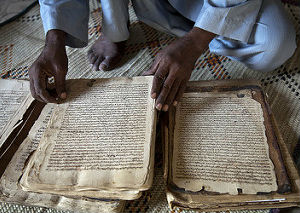It is said that those who burn books have no problem burning people, and that has certainly been true over the past century. Whether Hitler, Stalin, Mao, or Pol Pot, tyrants have tried to control people by controlling culture and the past. Fortunately, there are people like those documented in The Monuments Men (read my blog post on that here) who have resisted. Sometimes it is not active aggression against culture, but indifference, neglect, and the elements. There are heroes who have fought that, too. Take a look at these books for the ways the concerned few have fought against the dying of the light.
Abdel Kamer Haidara has spent most of his life acquiring manuscripts for the various libraries of Timbuktu, once a center of Islamic learning and art. Those adventures might be enough for a book all their own, but in The Bad-ass Librarians of Timbuktu and Their Race to Save the World's Most Precious Manuscripts by Joshua Hammer, they're only the beginning. Hammer spends a good deal of time describing the history of these fantastic works of art and intellect, including the other hairs-breadth escapes they have had. Also, Hammer narrates how the dramatic rise of Al-Qaida in the Islamic Mahgreb leads into their seizure of Timbuktu and the latest threat to these books. Haidara's incredibly brave and ingenious plan to rescue thousands of books from the rapacious hands of AQIM is amply justified when, sensing defeat at the hands of international forces, AQIM leaders burn whatever manuscripts Haidara and his colleagues cannot save. Loving descriptions of the books and the countryside in which many of them are found alternate with nail-biting suspense in this true-life adventure.
Of course, it is hard to discuss popular books about the preservation of culture without mentioning Thomas Cahill's How the Irish Saved Civilization. As the Classical world crumbled and the Dark Ages took over, many books of the ancients ended up in Irish monasteries and abbeys. There, the clerics painstakingly copied these works, creating great art of their own in the process, mostly immune from the war and migrations affecting Europe. As the centuries progressed, Irish religious traveled through the barbarian continent and left seeds of culture wherever they went. Cahill's book is written in a thoroughly accessible style, including the pronunciations of those trickily-spelled Irish words. You don't have to be Irish to appreciate this engaging tale.
A more recent true story of the preservation our cultural patrimony is Robert Clark's Dark Water, about the 1966 flood and restoration efforts in Florence, Italy. Florence was the center of the Italian Renaissance and it is hard to walk down so much as a block in that city without being reminded of the fact. When the river Arno burst its banks fifty years ago, what was not swept away was covered in slime and grime. Dark Water details the preservation and restoration efforts that drew an international cast of professional and amateur art lovers and experts. Of course, with that many passionate intellectuals, disagreements both large and small broke out, especially how to clean and refurbish artwork and books on an unprecedented scale. Still, the work of these "mud angels" stands as one of the greatest rescue efforts in the art world.
Got more books about saving literature and art? Tell us in the comments.



Add a comment to: Save The Books!